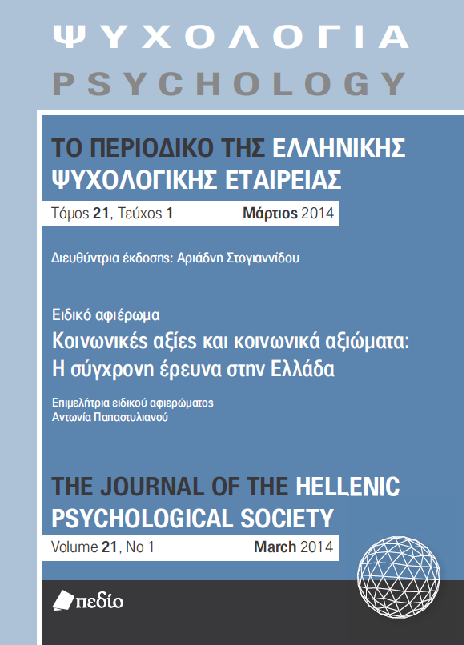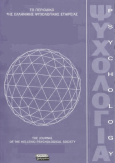Social Axioms in Greece: Qualitative Research

Abstract
Social axioms are generalized beliefs about oneself, the social and physical environment, or the spiritual world, and take the form of assertions about the relationship between two entities or concepts (Leung &Bond, 2002). The cross-cultural five factors structure: Social Cynicism, Reward for Application, Social Complexity, Fate Control and Religiosity, has been identified in Greece, while a sixth factor emerged in past studies. The present qualitative study aims it investigating the cultural specific social axioms. 362 students, young and older adults participated in 52 semi-structured interviews and 374 participated in 54 focus groups presenting their social axioms regarding the following topics: work, socio-economic crisis, family, religion, mental health, interpersonal and intergender relationships. According to the findings, the participants seemed deeply concerned with all the aspects of the
ongoing socio-economic crisis in relation to the unemployment, while family, interpersonal relationships and religion seemed to be critical in supporting Greeks during their everyday life and life planning.
Article Details
- How to Cite
-
Παναγιωτοπούλου Π., Καούρη Χ., & Καραγιάννη Ν. (2020). Social Axioms in Greece: Qualitative Research. Psychology: The Journal of the Hellenic Psychological Society, 21(1), 89–108. https://doi.org/10.12681/psy_hps.23263
- Issue
- Vol. 21 No. 1 (2014)
- Section
- SPECIAL SECTION

This work is licensed under a Creative Commons Attribution-ShareAlike 4.0 International License.
The journal PSYCHOLOGY adopts a Platinum open-access policy. Submission, processing or publication costs are waived by the Hellenic Psychological Society. Papers published in the journal PSYCHOLOGY are licensed under a 'Creative Commons Attribution-ShareAlike 4.0 International' licence. The authors reserve the copyright of their work and grant the journal the right of its first publication. Third-party licensees are allowed to use the published paper immediately after publication as they wish, provided they retain the defined by the license copyright formalities, regarding the reference to its author(s) and its initial publication in the journal PSYCHOLOGY. Moreover, any adjusted work should be shared under the same reuse rights, so with the same CC license.



